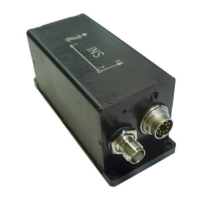INS
GUI User’s Manual
Inertial Labs, Inc
TM
Address: 39959 Catoctin Ridge Street, Paeonian Springs, VA 20129 U.S.A.
Tel: +1 (703) 880-4222, Fax: +1 (703) 935-8377 Website: www.inertiallabs.com
69
Note: If is important to set the magnetic declination correctly in the “Device Options” (see
Fig. 4.2) because the INS operation requires knowing the true heading but not the
magnetic one.
b) Output signals of the INS sensors: “Rate (deg/sec) “ – angular rate values
in deg/sec measured by angular rate sensors, “Accel (g)“ – linear
acceleration values in g measured by accelerometers, “Magn (nT)“ –
magnetic field intensity values measured by magnetometers in nT. Originally
all sensors data are in INS axes (X is lateral axis, Y is longitudinal axis, Z is
vertical axis). Axes X, Y, Z are object axes if non-zero alignment angles are
set for INS mounting (see Appendix E. Variants of the Inertial Labs
TM
INS
mounting relative to object axes).
c) Total measured magnetic field value in nT “Total magnetic field“.
d) Current temperature “Temperature (degC)“ inside the INS.
e) The set value of the magnetic declination “Mdec (deg)“.
f) Input supply voltage of the INS in VDC “Vinp (V)“.
g) Format of output data “Output Data Format: …“. This format is set in the
“Test Option” window (Fig. 4.1).
h) Current mode of the INS operation (Readiness, Awake or Sleep).
Current position and velocity are displayed in the bottom part of the
window Fig. 5.1:
a) In the “Position abs (deg, m)” column the INS absolute position is
displayed – Latitude (degrees), Longitude (degrees), Height (meters) which
are calculated in the INS.
b) In the “Position rel (m)” column the INS position relative to the start point
is shown. There changes of latitude and longitude are recalculated to
changes of linear coordinates in the North and East directions.
c) In the “Velocity (m)” column the North, East and Vertical components of
the INS velocity are shown.
d) In the “GNSS data” column the next information about GNSS data is
shown:
#Sat – is number of satellites used in navigation solution.

